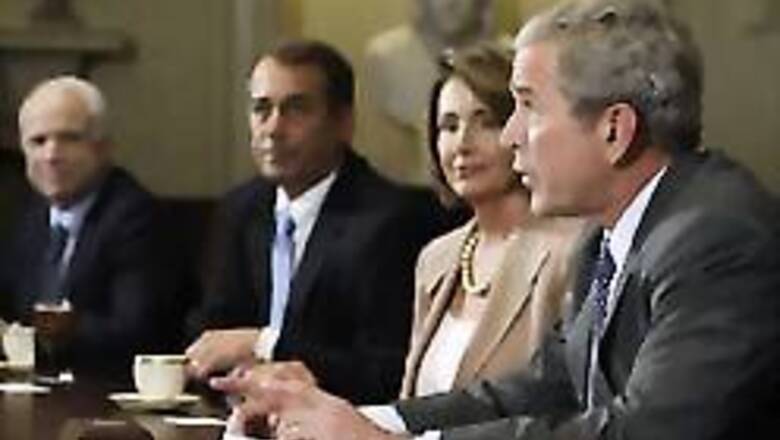
views
Washington: Talks on a $700 billion rescue for the US financial system fell into chaos on Thursday amid accusations Republican presidential candidate John McCain scuppered the deal, and US authorities closed Washington Mutual and sold its assets in America's biggest ever bank failure.
As negotiations over an unprecedented billion bailout plan to restore credit markets degenerated into chaos, the largest US savings and loan bank was taken over by authorities and its deposits auctioned off. US stock futures fell by more than 1 per cent, the dollar weakened and share markets in Asia fell.
The third-largest US bank JP Morgan Chase & Co said it bought the deposits of Washington Mutual Inc, which has seen its stock price virtually wiped out because of massive amounts of bad mortgages. The government said there would be no impact on WaMu's depositors and customers.
JP Morgan said it would be business as usual on Friday morning. Had a bailout deal been reached in Congress, it may have helped the savings and loan, founded in Seattle in 1889.
Efforts to find a suitor to buy WaMu faltered in recent days over concerns about whether the government would reach a deal to buy its toxic mortgages.
Earlier on Thursday, US lawmakers had appeared close to a final agreement on the bailout, lifting world stock markets and sending the dollar higher.
But an emergency White House meeting between Congressional leaders with US President George W Bush "devolved into a contentious shouting match," according to a statement from the McCain campaign.
In advance of that meeting, which included the two men battling to succeed him, Democrat Barack Obama and McCain, a compromise bipartisan deal seemed imminent. After the session, Congressional leaders said an agreement could take until the weekend or longer.
Democratic representative Barney Frank, who has played a key role in talks over the Bush administration proposal, said negotiations would continue on Friday, but with no sign that House Republicans would take part. Republican US Senator Richard Shelby bluntly told reporters, "I don't believe we have an agreement."
He later said the deal was in "limbo." A group of conservative Republican lawmakers proposed an alternative mortgage insurance plan, eschewing the Bush administration's Wall Street bailout just weeks before the November 4 election as many lawmakers try to hold on to their seats.
Democrats said McCain had scuppered the anticipated agreement by throwing his support behind that scheme. "Senator McCain has sided with the House Republicans who want to start with a completely different approach and reject what President Bush put forward," said representative Henry Waxman, chairman of the House Committee on Oversight and Government Reform.
"It's hard to imagine where we go from here," he said.
However, a statement issued by the McCain campaign said, "At today's cabinet meeting, John McCain did not attack any proposal or endorse any plan. The conservative group's plan calls for the US government to offer insurance coverage for the roughly half of all mortgage-backed securities that it does not already insure.”
The architects of the original plan, US Treasury Secretary Henry Paulson and US Federal Reserve Chairman Ben Bernanke, rushed to Capitol Hill for late night meetings to urge House Republicans to get back on track.
"It is critical that this legislation get done quickly," White House spokesman Tony Fratto said.
"We have serious concerns about the state of our credit markets." US Senate Banking Committee Chairman Christopher Dodd said a deal could take beyond Friday to reach and took a swipe at McCain, who returned from his presidential campaign to try to broker a deal. "What this looked like to me was a rescue plan for John McCain for two hours," Dodd told CNN.
"To be distracted for two to three hours for political theater doesn't help."
INJECTION OF POLITICS Also speaking to CNN, Obama said of McCain's involvement, "The concern that I have is that when you start injecting presidential politics into delicate negotiations then you can actually create more problems rather than less."
Earlier, news that a deal was near stabilized beleaguered money markets, frozen by a reluctance by banks to lend. The rate on one-month US Treasury bills shot higher as traders unwound safe-haven trades.
Still, officials from France to China voiced alarm. "A crisis of confidence without precedent is shaking the global economy," French President Nicolas Sarkozy said in a speech in Toulon, France.
As Thursday's meeting began, Bush warned, "We're in a serious economic crisis in the country if we don't pass a piece of legislation."
Frank, the powerful Democratic chairman of the House Financial Services Committee, said before the Bush meeting that the deal would give the money to the US Treasury in installments rather than a $700 billion lump sum the Bush administration wanted.
The enormity of the deal, which would cost every man, woman and child in the United States about $2,300, led many lawmakers to ask Paulson during two days of rancorous hearings this week to take the cash in installments.
The bailout exceeds total lending by the International Monetary Fund since its inception after World War II.
The IMF has loaned $506.7 billion since 1947 to countries in crisis as far flung as Argentina, Britain, Turkey and South Korea.
Frank also said the deal would allow the government to take part-ownership of banks and ban companies that sell toxic assets to the government from paying massive "golden parachutes" to executives being fired.
Reflecting that the current crisis appears to be the most serious since the Great Depression of the 1930s, fresh Federal Reserve data showed US banks and money managers have borrowed a record $188 billion daily in recent days from the Fed -- a daily amount roughly equal to Argentina's annual economic output.
"This looks like the balance sheet of a central bank that is keeping the financial system on life support," said Michael Feroli, US economist with JP Morgan in New York.
The swirl of political theater and meetings in Washington followed fresh turbulence in the world economy.
Orders for costly US manufactured goods plunged in August, new-home sales hit a 17-year low, while new claims for jobless benefits shot up last week.
Top US industrial conglomerate General Electric Co, widely seen as a bellwether of the US economy, issued a profit warning, citing "unprecedented weakness and volatility" in the financial services market.
The crisis reverberated in Amsterdam and Brussels, where Fortis NV, the Belgian-Dutch financial services group, denied a rumor the Dutch central bank had asked a Fortis rival to support the company's liquidity position.
Fortis shares sank as much as 21 per cent to 14-year lows. China's second largest insurer Ping An Insurance, which owns 5 per cent of Fortis, dived 8.7 per cent because of the rumor.
In Asia, hundreds of people lined up outside the Hong Kong branches of the Bank of East Asia Ltd, some sleeping there overnight, to withdraw their savings.
China's banking regulator sought to reassure jittery financial markets, denying a report that it had told local banks to stop lending to US banks.
INTENSE BAILOUT TALKS The crisis comes after a month of turbulence marked by the government's takeover of mortgage companies Fannie Mae and Freddie Mac, the bailout of insurer American International Group Inc, and the bankruptcy filing of investment bank Lehman Brothers Holdings Inc.
Concern lingered that even with a bailout, the United States may stumble, prompting a global slowdown. German Finance Minister Peer Steinbrueck said one outcome of the crisis would be a less dominant role for the United States in the global financial system. "The United States will lose its superpower status in the world financial system. The world financial system will become more multi-polar."

















Comments
0 comment